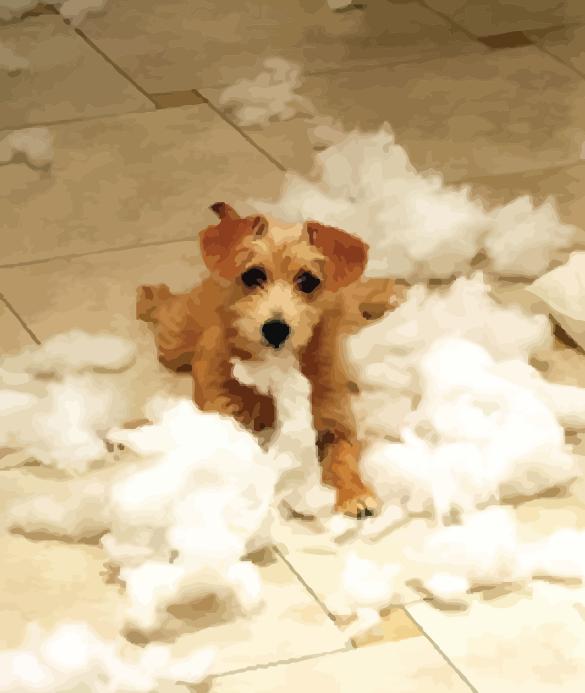Destructive Behavior in Puppies

Puppies are known for their destructive behavior. Many owners accept it as the price of having a cute pet of their own, but when the dog is older, the cuteness tends to wear thin, particularly if the damage is more than the occasional chewed-up shoe. It is possible for a bored dog, left on its own for long, to chew up carpets and drapes, bite large chunks out of solid items of furniture, and even strip wallpaper off the walls. For some owners it is only a matter of time before the expense and the stress leads them to decide the dog must go. Animal shelters are full of dogs who have been rejected for this reason.
Puppies chew when they are teething (from about 3 to 7 months of age) in order to relieve their gums as they lose their baby teeth and the adult teeth are erupting. Although their jaws are not very powerful at this age, the baby teeth are extremely sharp and will leave marks. Provide plenty of hard, safe chews such as rawhide bones and rubber toys for the puppy to gnaw on. Praise it when it settles down to chew one of these and then leave it in peace. Avoid giving it old slippers, as this may convey the wrong message about what it is allowed to chew.
Use a baby gate to close off forbidden areas of of the house and remember to keep bedroom doors closed. If you do catch the puppy gnawing on the furniture or other banned object, reprimand it immediately and direct its attention to a legitimate substitute.
Many puppies go through a second, even more destructive phase of chewing between 8 and 12 months. Hunting and retrieving dogs are notorious for this as they have an instinctive urge to use their mouths. Give your dog plenty of novel items to chew, such as cardboard boxes and old newspapers, as well as strong rubber chews.
Preventing Boredom
Adolescent dogs are particularly prone to boredom. They need exercise, mental stimulation, and a variety of outlets for their energy in the form of games and exposure to different environments and challenges. Lacking them, they will find their own amusements — chewing up the furniture or digging their way under the garden fence. Mental stimulation is every bit as valuable as physical exercise. Hide objects for the dog to find. Give it puzzle toys to play with.
A dog left alone for long periods in the day quickly becomes bored and will turn to destructive activities. A dog is not the right pet for an owner who works full-time, unless alternative arrangements can be made to look after it while the owner is absent.
Q&A
How long should a puppy or immature dog be left on its own?
This varies a great deal according to the age and type of dog, but all young animals find it hard to cope with long periods of isolation. Even a mature dog should not be left for more than 4-5 hours.
My puppy is always chewing the leg of a particular chair in the living room. Have you any suggestions for stopping him?
A well-aimed squirt from a water pistol to startle the puppy can be an effective deterrent. Try not to let him see that you are operating the pistol. Hide behind the chair — he will think the jet of water came from there and won't want to approach it again. Immediately offer him something else to chew. Tossing a can full of pebbles near (not on) the puppy has the same effect.




Leave a Reply